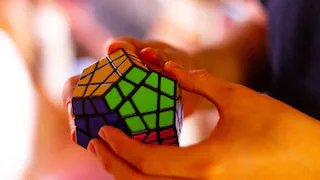
Transcending duality & time
- Matthieu P.J.
- Spirituality
- August 15, 2021
Table of Contents
What is duality?
We live in a world of duality. What does that mean? It means everything in this universe exists in reference to other things; those other things provide a context. Nothing exists separated from the rest. Let’s take an example: it’s summer and you feel hot outside under the sun. But what is ‘hot’? How would you describe it to someone who’s feeling it for the first time, let’s say a child. Well, one simple way to explain it is that it’s the opposite of ‘cold’. You can compare two climates as being cold or hot in relation to each other. But without context, a hot weather does not mean anything.
Duality extends to everything, yet we tend to take it for granted because it’s part of our constant experience. Importantly, duality applies to space/time.
To navigate in space, we define up and down, right and left, forward and backward. From a given point, along a certain direction, we only have two choices if we choose to move. That gives us a coordinates system to agree on the position of objects.
To navigate in time, we have equally defined a ‘position’ for events. The two positions are called past and future. In the middle is where you stand now: the present.
Enters the Ego
Duality is linked to an important concept in psychology: the ego.
The ego is the mental structure that allows us to navigate this universe of duality. In fact, all that the ego knows is duality. It is a prisoner of that paradigm. The ego constantly needs to assess things against the scale of duality. We call it judgement. Today was more tiring that yesterday at work. I hope my next holidays are better than the last ones. I miss being a child, everything was easier. If only I could be as successful as my friend, he’s done well in life. I wish I had more time to do all I want to do. It hardly ever stops—which is why you should not constantly listen to the chatter of the ego mind.
The ego applies comparison to just about everything. It’s all it knows. But deep inside, it can make you feel rather miserable. Especially when you realise the size of the scale. Let’s say material success and abundance—one of the key metrics in our modern world—is important to you. Well, you know, you want to have a lot of money. Soon enough, you will end up comparing how much you earn against your family, friends, company etc. And you will find that you are likely not on the top of the scale (as the highest-earner) and therefore that some people are more successful than you. And it hurts the ego, badly… You could also look at the people who earn less than you to comfort yourself, and for a moment the ego will feel glorified and good. Till you look again at what you don’t have. The story goes on and on… Desire is born out of comparison.
The ego does its job: it helps you function in this material world, ruled by material laws. All it knows is recognising patterns through the physical senses, comparing them to your recorded memories and providing options for your behaviour. And that’s so important: because it literally keeps you alive.
But in doing so, it also keeps you trapped in the ‘standard’ vision of the world. One based on duality.
Beyond the ego
The big problem with the ego is that… it’s not who you truly are. It’s the small self that exists within you, hiding your real self. As you accumulate life experience and wisdom, you may start feeling there is much more to this world than can be perceived by the senses and computed by the limited capacities of the ego.
Significantly, the ego is a structure that identifies to the havings and doings of your existence. It needs a sense of identity to re-assure itself. I am a boy, I am bad at maths, I like playing football, I don’t like broccoli etc. Through constant reinforcement—mostly unconscious—the ego acquires a sense of identity over time. And by the time someone reaches adulthood, that sense of identity is confused with the real self. In other words, the individual is in the grip of his ego.
Whenever the individual is confronted with information that is challenging the power of the ego, there will be a sense of discomfort arising—often unconsciously. The ego will feel the threat and create strategies to keep its domination over the individual’s life trajectory. Among these strategies are the well-known behaviours that sabotage one’s life ambitions: we call them procrastination, distraction, diversion, addiction, avoidance etc. They are a response to the levels of fear and anxiety felt by the ego. They keep man trapped in a condition that is difficult to escape, at least until he sees the light.
All true spiritual teachings warn the seeker of the illusions generated by the ego. These illusions are the source of suffering and until the ego itself is transcended, man will not see the truth for what it is.
Transcendence does not mean suppression by the way, it means integration. It means making peace with the mental coping structure that the ego truly is, and that keeps the body functional and operating in a material world. It means: going beyond.
Beyond duality—debunking ‘past’ and ‘future’
The problem with duality is that it’s not the base reality in which we live. It is an illusion, just like the ego.
I’ll explore one topic for illustration: time. You’ve been taught at school that time, conceptually, is a kind of an axis starting in the past, with the present in the middle, and pointing towards the future. But unlike turning left or right at an intersection, you can only go towards the future no matter what. Time flows only in one direction.
But have you ever wondered if that was even true?
What is the past? What is the future? They are merely naming conventions we use for a position in time that is not now. But do we ever reach the future? Or were we ever in the past? It depends only on the perspective of the observer. The only thing you can ever experience is the present. No matter how long you think about it, this conclusion is inevitable. That is so obvious and so simple.
Past is just the name we give to something we remember; future is the name we give to something we anticipate. Both past and future exist only in the mind of the observer, they have no objective reality.
At the root of existence, there is only one moment: now. And that moment stretches into eternity. Without beginning and without end. A single moment that lasts forever… That is the spiritual view shared throughout the ages, in contradiction with the materialistic view.
Oh, and your ego knows perfectly well, deep inside, that time does not exist. Yet it lives in this conflicted situation where it’s been taught by society that it does, and experience seems to concur. It’s been programmed. What ensues is that the ego will keep track of time for you frantically. Your day starts at 8am, you get back home at 6pm, your next appointment is tomorrow at 11am etc. When you start placing your attention on time, you can’t help but chasing it. You are taught that time is precious, rare, that time is ‘money’ and all these sort of things. Again, the ego will make you feel miserable because it compares things constantly. Things may not be as good the second time as they were there first time and you’ll feel disappointed. Or you may regret the ‘good old days’ when things seemed simpler; and fail to have a peak experience once more. No matter what, the ego is constantly computing comparisons between timelines and seem biased in two dominant ways: making us regret the past and feel anxious about the future.
We even rely on wonderful devices called clocks that are said to measure time. How can one measure what does not even exist? Is it a paradox or human madness? The latter. A clock does not measure time, it only measures movement. A mechanical clock has a system of springs and gears that move at a determined pace. Such pace is designed to match the agreed conventions of so-called seconds, minutes, hours etc. A quartz clock (or your smartphone nowadays) use electronic circuits to count tiny movements from the vibration of a quartz and use a multiple to match the same definitions of seconds, minutes, hours etc. Even a so-called atomic clock will rely on the fluctuations of elementary particles and does not directly measure time. We can measure space, but not directly time.
Even to the ancient people who used the celestial bodies to measure the passing of time in terms of season, they merely observed for example the position of the sun in the sky throughout the year to mark the equinoxes and solstices. These observations were based on the movement of the sun, not time itself. No matter how hard you try, you can’t devise a system to measure time intrinsically. We just deceived ourselves in thinking we had measured time. But because we all agreed that we do, it goes unnoticed.
And if we could be so wrong about time—and that does not bother the vast majority of people by the way—it begs the question: what else are we mistaken about in this universe?


